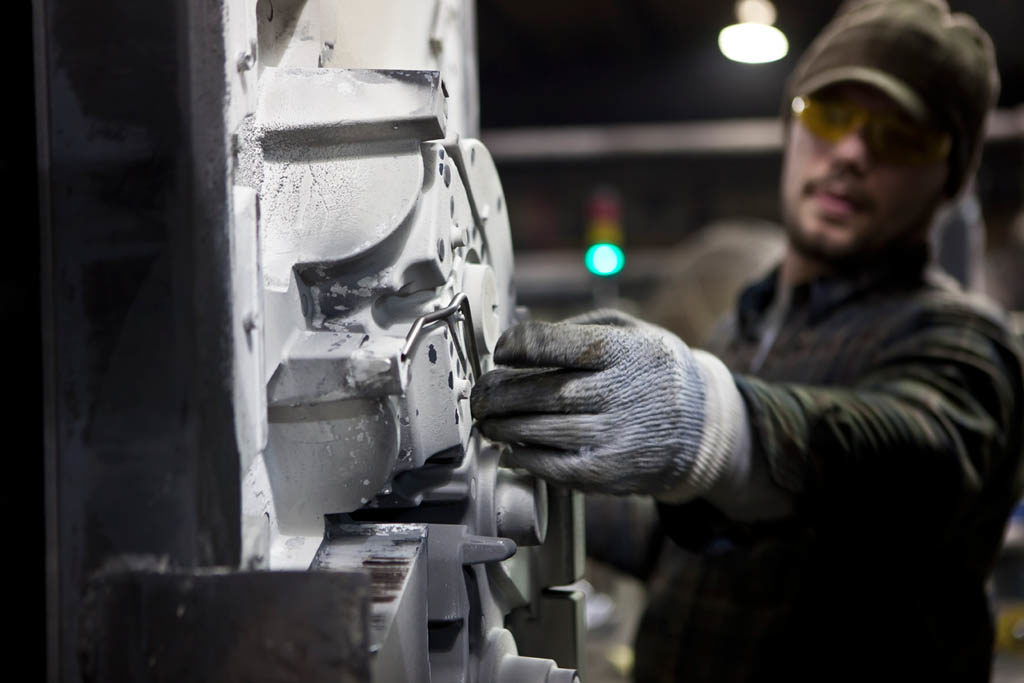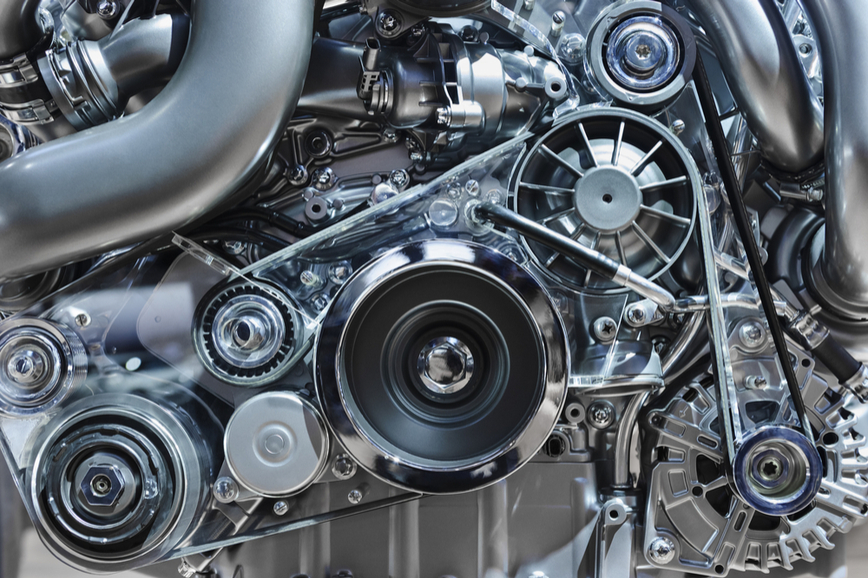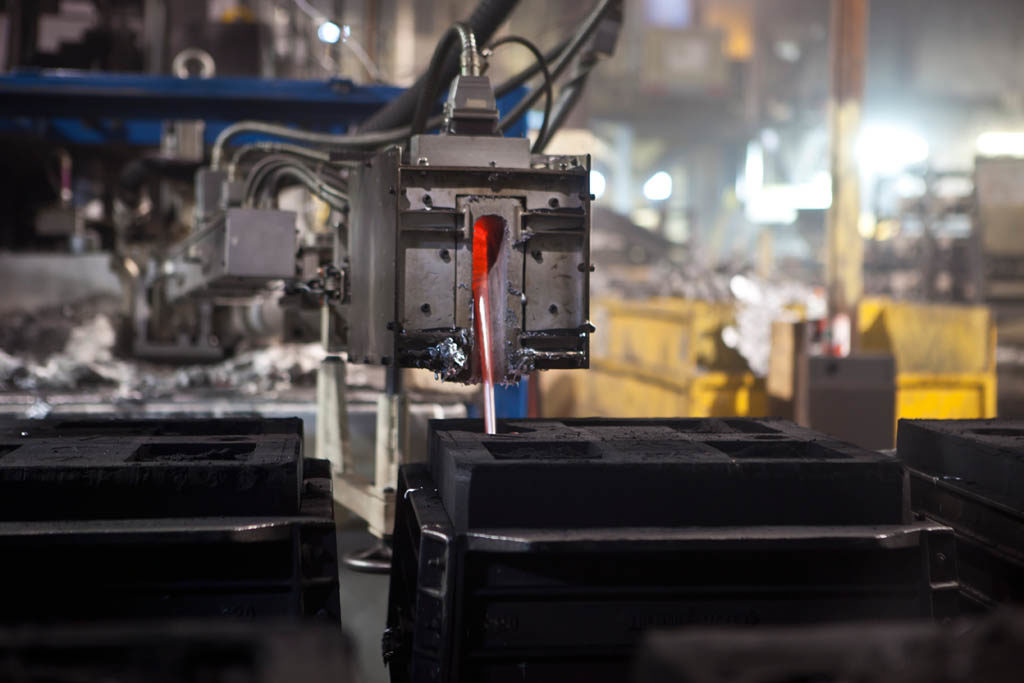Aluminum Casting: The Lighter, Less Corrosive Casting Option
Aluminum casting is becoming increasingly popular in a wide variety of industries. Lighter than steel and less expensive to cast than titanium, casting in aluminum offers several distinct advantages for a wide array of industries.
What is Aluminum Casting?
In aluminum casting, molten aluminum is poured into a mold and then cooled. After the mold is removed, what remains is a strong, lightweight part. The use of cores, placed inside the molds before the aluminum is poured, allows this process to produce complex parts. Coupled with post-casting machining and finishing work, aluminum casting can meet tight tolerances.
Learn more about Aluminum Casting
- Advantages of Aluminum Casting
- Adding Strength to Aluminum Casting
- Aluminum Casting Process
- Industries Served By Aluminum Casting
- Aluminum Alloys Used in Casting
Four Advantages of Casting in Aluminum
1. Weight
Aluminum is indeed everywhere, from the cars on the ground to the planes in the air all the way to the international space station. In fact, aluminum is the fastest growing automotive material. One of the main reasons for that: weight.
Very rarely do you run into a scenario where you want a part to be heavier. Lighter parts are easier to transport. They also place less stress on the frame supporting them.
For many industries, though, the biggest advantage is fuel efficiency. In an era of both more stringent fuel economy standards and high gas prices, efficiency is the name of the game, and every pound of weight that you can shave off a car, truck, RV or other vehicle is going to help increase fuel economy ratings. If the car is electric, substitute battery life for fuel economy.
Aluminum is roughly one-third the weight of steel. If weight is a factor in your industry, every part that you can swap steel for aluminum offers significant reductions.
2. Aluminum is Corrosion-Resistant
Anyone who has dealt with aging iron or steel know they have one significant drawback: corrosion. If you are making parts from them, you need to take measures to stop them from rusting.
Of course there are ways to address this, ranging from opting for stainless steel to other corrosion treatments.
All of these add costs while basically giving you the corrosion resistance that aluminum naturally provides.
3. Thermal Conductivity
Aluminum has a high degree of thermal conductivity, making it ideal for any application that needs to dissipate heat quickly.
The most obvious application of this is in cookware, but that is far from the only scenario in which this would be an advantage in increasing a part’s efficiency.
4. What Aluminum Castings are Not
While aluminum castings have plenty of advantages for what they are, they also avoid many potential drawbacks that can be associated with some other metals.
They aren’t magnetic, they aren’t toxic, and they don’t spark.
Aluminum Adds To Sustainability
According to the Aluminum Association, “aluminum’s lightweight {material} contributes to increased fuel efficiency in vehicles ranging from passenger cars to armored tanks.” In addition, “the metal’s 95 percent light-reflectivity contributes cooling efficiencies to “green” buildings and improves the energy production efficiency of solar cells.” So basically, the aluminum industry is making consistent improvements when it comes to the environment because of their production of aluminum through primary and secondary processes.
Essentially, the foundry and CNC machining industries need a single-source supplier for aluminum casting solutions. Having a single-source supplier not only makes production highly efficient, but it can provide services for a variety of industries as well. At LeClaire Manufacturing, we serve numerous industries such as agriculture, railroad, and even military & defense.
The One (Sort-of) Drawback: Strength
Aluminum is strong.
It just isn’t steel strong.
Chances are, you will never see a skyscraper being built out of aluminum beams. That’s because the same density that makes steel so heavy gives it a strength advantage.
While there are certain applications where aluminum might never be a fit, for the overwhelming majority of casting projects it is plenty strong. Especially when you include two methods that increase its strength.
Picking a Strong Aluminum Alloy
While we call it aluminum casting, the metal used often is an aluminum alloy, a combination of aluminum with another metal. Different aluminum alloys have different properties and therefore have different uses.
While some of them offer greater malleability that can be an advantage in machining costs, others, such as those with copper, offer a greater degree of strength.

Steel Inserted Aluminum Casting
What if you have a project where you want the light weight of aluminum but certain areas require a greater strength than that metal can provide.
Steel inserted aluminum is a great alternative.
The inserted steel provides greater strength in high-stress areas without sacrificing the significant weight advantage of aluminum castings.
Our engineering team has the skills and experience to design and modify parts that require cast-in inserts.
Aluminum Casting Processes
Typically, two of the most-used casting methods are permanent mold casting and sand casting. Ultimately, aluminum casting is a simple and inexpensive way of constructing an array of products. They differ in the way in which the mold is formed and, in some cases, how the aluminum is inserted into the mold.
Sand Casting
At LeClaire we use a green, or wet, sand casting process. We pack and form the sand around a pattern to form a cavity (in two halves) while leaving room for “runners.” These are the openings into which the molten aluminum is poured.
After the aluminum cools and hardens, the sand mold is broken away and any cores are broken down and removed, leaving behind solely the aluminum part. The sand molds are quick, simple, and inexpensive to create, but a new mold is needed for each part produced.
The part then goes through any necessary finishing processes, including removing any remaining sand, and tooling before it is ready to ship.
Permanent Mold Casting
Unlike in sand casting, the mold in permanent mold casting is not broken down after each use. Most often the molds in these cases are made from iron or steel.
Much of the rest of the process is like in sand casting. We pour the aluminum into the mold through the runners. After cooling, we remove the mold so it can then be used again to cast the next part.
The mold is not truly “permanent” because it will eventually break down. It can produce many more parts for each mold, however, than sand casting.
What Aluminum Casting Method is Right for You?

Industries Using Aluminum Casting
Because of their strength and lighter weight, aluminum parts are used in a whole host of industries.
If it is moving, chances are it has aluminum cast parts
- Automobiles
- Aerospace
- Trains
- Military vehicles
- RVs
- Ships
- Farm Equipment
At LeClaire, we have been a trusted manufacturer for these industries and more. That is because not only do we invest in advanced equipment but we also have the experience and skill required to make complex parts with tight tolerances.
Aluminum Alloys Used in Casting
While all aluminum castings use aluminum, not all “aluminum” is the same.
The aluminum used in castings usually isn’t pure aluminum but rather aluminum alloys, mixtures of aluminum and another metal.
In each case, the properties of the metals mixed with the aluminum, as well as the ratios of the metals, can create specific traits useful to certain industries.
An alloy that is mostly aluminum with a bit of silicon mixed in is highly ductile and formable. One with copper as the primary element, however, lends greater strength while being less corrosion resistant.
At LeClaire Manufacturing, we know that when it comes to aluminum, one size certainly does not fit all. We use our decades of aluminum casting experience to pick out the right aluminum alloy for each job based on properties such as strength, weight, and workability
Learn More About Aluminum Alloys
Complex Castings At LeClaire
At LeClaire Manufacturing we have the ability to create complex castings and complex machining. We strive to create aluminum products that serve our clients year after year with the same consistency and quality. We want to be a loyal, responsive, and supportive supplier. Please contact us today to request a free quote.


